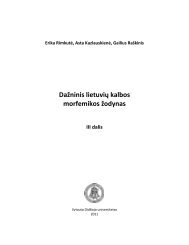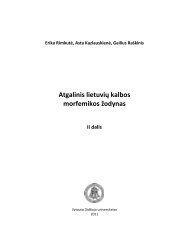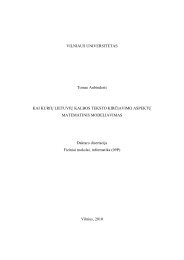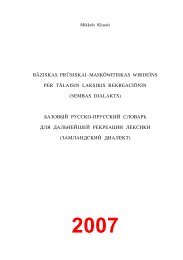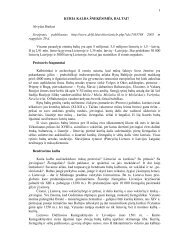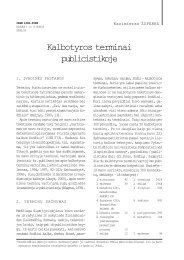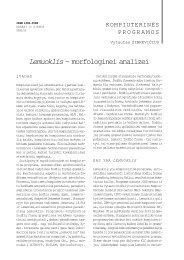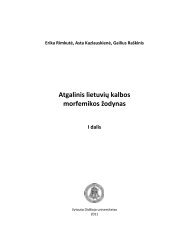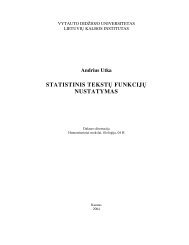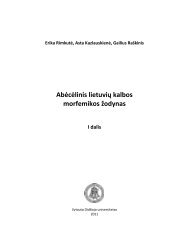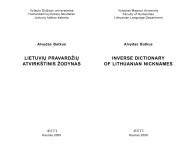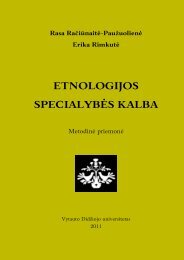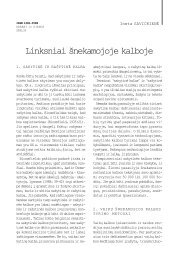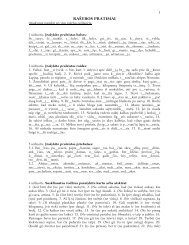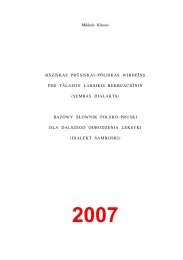HISTORICAL GRAMMAR OF OLD PRUSSIAN
HISTORICAL GRAMMAR OF OLD PRUSSIAN
HISTORICAL GRAMMAR OF OLD PRUSSIAN
You also want an ePaper? Increase the reach of your titles
YUMPU automatically turns print PDFs into web optimized ePapers that Google loves.
72<br />
V. Maþiulis<br />
* 164. Nom. pl. masc. stai (III), staey (I, II with -aey = circumflex<br />
-ãi, * 96) ‘those; these’ = Pr. (Cat.) *stãi ends in -ai which is a nominal<br />
(subst.) inflection. This inflection replaced original pron. *-ei (cf. e.g.<br />
gen. pl. stçison with this archaic *-…ei, Endzelîns l. c.). These Pr. (Cat. )<br />
stai, stei come from Pr. *tai, *tei respectively, both originating in Balt.<br />
pron. *tei (cf. also * 96). For more exhaustive explanation cf. BS 170 ff.<br />
Note: An opinion, as if nom. pl. fem. stai (3x) is not a mistake<br />
(Endzelîns SV 79), is incorrect (cf. also Rosinas BÁM 88) 74 .<br />
* 165. Gen. pl. masc., neut. stçison (4x), steison (8x), stçisan<br />
(1x) reflect allomorph alternants Pr. (Cat.) *stçisun // *stçisan (with a<br />
circumflex *-…ei-) < Pr. *t…eisun // *t…eisan. These form were also feminine<br />
(Endzelîns SV 79).<br />
It seems that the morphs Pr. (Cat.) gen. pl. *-‹un and *-‹an imply an<br />
accented Balt. *-ôn and inaccented Balt. (*-ôn >) *-`n (> Pr. *-‹an) respectively:<br />
cf. origin of nominal Pr. gen. pl. *-‹un // *-‹an, * 98.<br />
* 166. Dat. pl. (attested for all genders): stçimans (11x), steimans<br />
(18x), steîmans (2x probably a mistake instead of stçimans or steimans,<br />
cf. Endzelîns l. c.).<br />
Pr. stçimans (with a circumflex *-…ei-) comes from Pr. *t…eim#`ns <<br />
Balt. *t…eim#ôns (for *-m#ôns see * 103). The circumflex *-…ei- was replaced<br />
with an acute one when Balt. *-çi- turned into *-×#ç [cf. Lith. týemus, Latv.<br />
ti…em(s)].<br />
It seems that the segment *t…ei- in Balt. *t…eim#ôns is of the same<br />
origin as Balt. nom. pl. masc. *t…ei ‘those, these’ with a circumflex *-…ei.<br />
The latter was replaced with an acute *-×#ç (*t…ei > *t×#ç, cf. Latv. ti…e, although<br />
Lith. ti…e 75 ) at the same time as *t…ei- > *t×#ç- in *t…eim#ôns.<br />
* 167. Acc. pl. (masc.) is stans. Two allomorphs may be<br />
distinguished in this form theoretically: 1) an unaccented Balt. *t#`ns (<<br />
*t#ôns) and 2) an accented Balt. *t#ôns. The 1st was generalized in WBaltic<br />
74 For a form of collectivity in -ai cf. ftn. 46. Typologically cf. Polish “forma mianownika<br />
rzeczowa” (this does not imply a similar paradigmatic form in Prussian). – L.P.



